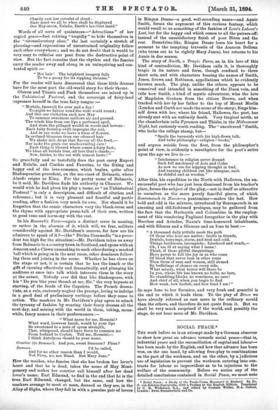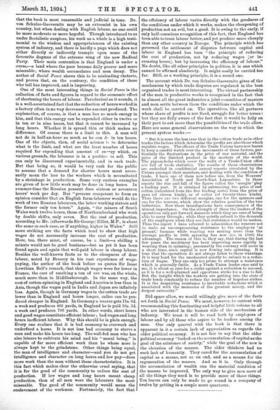SOCIAL PEACE.*
THE work before us is an attempt made by a German observer to show how great an advance towards social peace—that is, industrial peace and the reconciliation of capital and labour— has been made by the English, and how that advance has been won, on the one hand, by allowing free-play to combinations on the part of the workmen, and on the other, by a judicious use of legislation to prevent the workmen entering into con- tracts for labour so improvident as to be injurious to the welfare of the community. Before we notice any of the detailed conclusions contained in Social Peace, we must note • Social Peace: a Study of the Trade-Union Movement in England. By Dr. G. von Schulze-Gaeirernitii, with a Preface to the English Edition. Translated by 0. M. Wicketeed, B.A., and edited by Graham Wallas. M.A. Oxford. London Swan Sonnenschein and Co. that the book is most reasonable and judicial in tone. Dr. von Schulze-Gaevernitz may be an extremist in his own country, but when dealing with English labour, no one could be more moderate or more hopeful. Though introduced to us under Socialistic auspices, his work as a whole is a high testi- monial to the wisdom and appropriateness of the existing system of industry, and there is hardly a page which does not either directly or indirectly trample upon some of the favourite dogmas of the extreme wing of the new Radical Party. Their main contention is that England is under a curse,—a land where the poor become daily poorer and more miserable; where wealth accumulates and men decay. The author of Social Peace shows this to be misleading rhetoric, and proves that, on the contrary, the condition of those who toil has improved, and is improving.
One of the most interesting things in Social Peace is the collection of facts and figures in regard to the economic effect of shortening the hours of labour. Paradoxical as it sounds, it is a well-ascertained fact that the reduction of hours worked in a factory often in no way decreases the amount produced. The -explanation, of course, is that a man has so much energy in him, and that this energy can be expended either in twelve or in ten or in nine hours, but that it cannot be increased by long hours. Whether it is spread thin or thick makes no difference. Of course there is a limit to this. A man will not do in half-an-hour as much as he can (Is in ten hours. One of the objects, then, of social science i. to determine what is the limit, and what are the least number of hours required for expending that amount of en'—gy which, on various grounds, the labourer is in a position to sell. This can only be discovered experimentally, and in each trade. But that being so, it would be very rash for the public to assume that a demand for shorter hours must neces- sarily mean the loss to the workers which is necessitated by a shrinkage in production. Some very curious examples are given of how little work may be done in long hours. In summer-time the Russian peasant does sixteen or seventeen hours' work per day. But "persons competent to form an opinion consider that an English farm-labourer would do the work of two Russian labourers, the latter working sixteen and the former only ten hours." Again, " the miners of South Wales work twelve hours, those of Northumberland who work by double shifts, only seven. But the cost of production, according to Mr. (afterwards Sir George) Elliot, M.P., is about the same in each case, or if anything, higher in Wales." Still more striking are the facts which tend to show that high wages do not necessarily increase the cost of production. Here, too, there must, of course, be a limit—a shilling a minute would not be good business—but as yet it has been found again and again that well-paid labour is cheap labour. Besides the well-known facts as to the cheapness of dear labour, noted by Brassey in his vast experience of wage- paying, the author of the book before us quotes Sir Isaac Lowthian Bell's remark, that though wages were far lower in France, the cost of smelting a ton of ore was, on the whole, much more than in Middlesborough. In the same way, the cost of cotton-spinning in England and America is less than in Asia, though the wages paid in India and Japan are infinitely less. Again, though in Germany wages in the cotton trade are lower than in England and hours longer, calico can be pro- duced cheaper in England. In Germany a weaver gets lls. 8d. a week and produces 466 yards, in England he is paid 16s. 3d. a week and produces 708 yards. In other words, short hours and good wages constitute efficient labour ; bad wages and long hours inefficient labour. Why this should be is plain enough. Every one realises that it is bad economy to overwork and underfeed a horse. It is not less bad economy to starve a man and make his hours too long. The well-fed man who has
also leisure to cultivate his mind and his " moral being," is capable of far more efficient work than he whose nose is
always kept to the grindstone. Other things being equal,
the man of intelligence and character—and you do not get intelligence and character on long hours and low pay—does more work than the man without these characteristics, It is
this fact which makes clear the otherwise cruel saying, that it is for the good of the community to reduce the cost of
production. If low wages and long hours meant cheap production, then of all men were the labourers the most miserable. The good of the community would mean the enslavement of the workmen. Fortunately, the fact that the efficiency of labour varies directly with the goodness of the conditions under which it works, makes the cheapening of production not an evil, but a good. It is owing to the early, if only half-conscious recognition of this fact, that England has been able to treat labour better, and yet produce more cheaply than any other country in Europe. The principle which has governed the settlement of disputes between capital and labour in England has been " the principle of reducing the cost of production, not by reducing wages [or in- creasing hours], but by increasing the efficiency of labour." No doubt, like all other principles in politics, it is one which cannot be affirmed absolutely. It might easily be carried too far. Still, as a working principle, it is a sound one.
The account which Dr. von Schulze-Gaevernitz gives of the mechanism by which trade disputes are regulated in the best organised trades is most interesting. The virtual partnership of the men in productive works is recognised in the fact that in almost all the great industries a joint committee of masters and men settle between them the conditions under which the work shall be carried on. The operatives, like all partners whose share of profits is not fixed, struggle for better terms but they are fully aware of the fact that it would be folly on their part to ask more than the possibilities of the trade allow. Here are some general observations on the way in which the present system works :-
" But it is none the less true that in the cotton trade as in other trades the factors which determine the profits are also those which regulate wages. The officers of the Trade Unions have now learnt to keep a careful watch over the movements of these factors, par- ticularly the fluctuations in the price of raw material, and the price of the finished product in the markets of the world. The pigeon-holes which cover the walls of a Trade-Union office are full of trade statistics. The results of these observations are embodied in confidential annual reports circulated by the Unions amongst their members, and dealing with the condition of trade. I have one of them now before me, from the Weavers' Association of North and North-East Lancashire. In these reports the rise and fall of the figure called the ' margin' play a leading part. It is obtained by subtracting the price of raw cotton (calculated from the five leading sorts) from the price of yarn (of eleven kinds), or of calico (of twenty-three kinds). Thus there are two different margins, one for the spinners and one for the weavers, which show the relative position of the two industries. Now these investigations have consequences of the utmost importance. On the strength of them the leaders of the operatives only put forward demands which they are sure of being able to carry through ; while they quietly submit to the demands of the employers when they see that resistance would be useless. Thus the report I have referred to admonishes the weavers not to make an uncompromising resistance to the employers ' at present,' because while weaving was making more than the average profits in 1886, spinning has now (i.e. in 1888) the advantage. The reason of this is, they say, that during the last few years the machinery has been improving more rapidly in weaving than in spinning; presumably the contrary will occur in a short time, since capital is now flowing into spinning. It is true that the operatives do not always listen to these warnings. It is very hard for the uneducated quietly to submit to a reduc- tion of wages. They are only too prone to attempt a resistance which is generally futile. As a Trade Union leader once said to me, it is about as rare for a strike against a reduction to succeed, as it is for a well-planned and opportune strike for a rise to fail. But the insight which the workers are getting into the state of trade tends constantly to reduce the number of hopeless strikes. It is the despairing resistance to inevitable reductions which is associated with the memories of the greatest misery, and the deepest animosity."
Did space allow, we would willingly give more of the facts set forth in Social Peace. We must, however, be content with recommending this fascinating and helpful little volume to all who are interested in the human side of the mechanism of industry. We trust it will be read both by employers of labour and by all those who aspire to be leaders among the men. Our only quarrel with the book is that there is apparent in it a certain lack of appreciation as regards the older political economy. It is not fair to say that the older
political economy "looked on the accumulation of capital as the goal of the existence of society," while the goal of the new is the elevation of the masses. The older thinkers had no such lack of humanity. They cared for the accumulation of capital as a means, not as an end, and as a means for the regeneration of the masses. And so it is. Only through the accumulation of wealth can the material condition of the masses be improved. The only way to give men more of all the things they need is to provide more of those things. Ten loaves can only be made to go round in a company of twelve by getting in a couple more quarterne.



































 Previous page
Previous page